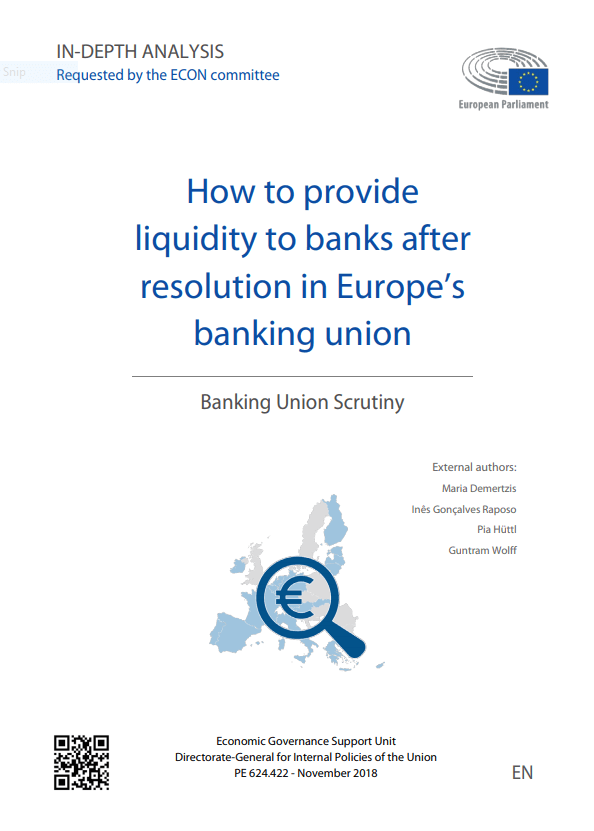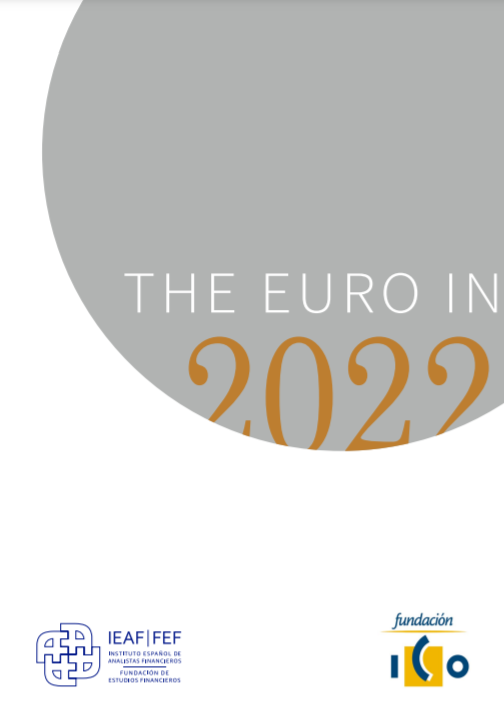External Publication
How to provide liquidity to banks after resolution in Europe’s banking union
Banks deemed to be failing or likely to fail in the banking union are either put into insolvency/liquidation or enter a resolution scheme to protect the public interest. After resolution but before full market confidence is restored, the liquidity needs of resolved banks might exceed what can be met through regular monetary policy operations or emergency liquidity assistance. All liquidity needs that emerge must be met for resolution to be a success. In the euro area, this can only be done credibly for systemically important banks by the central bank.
This paper was provided at the request of the Committee on Economic and Monetary Affairs of the European Parliament and commissioned by the Directorate-General for Internal Policies of the Union and supervised by its Economic Governance Support Unit (EGOV). The opinions expressed in this document are the sole responsibility of the authors and do not necessarily represent the official position of the European Parliament. The original paper is available on the European Parliament’s webpage (here). © European Union, 2018.
When banks are deemed to be ‘failing or likely to fail’ in the European Union’s banking union, they are either put into insolvency/liquidation or enter a ‘resolution scheme’. The Single Supervisory Mechanism (SSM) typically decides that a bank is failing or likely to fail after consulting the Single Resolution Board (SRB).
Funding of banks after resolution has recently become part of the euro-area political debate following the resolution of Banco Popular. Conceptually, two aspects have to be distinguished when considering funding of banks in resolution: how to restore solvency and how to provide liquidity. Solvency is restored through bail-in and recapitalisation if needed, including from public funds. Liquidity needs, however, need to be met differently.
In normal times, the European Central Bank (ECB) and national central banks (NCBs) provide liquidity either through ordinary monetary policy operations (ECB) or through emergency liquidity assistance (NCBs). In times of resolution, a gap emerges in the European framework: the treaties allow the ECB to provide liquidity only against collateral. But what happens if the newly-created bank (or old restructured bank) lacks sufficient collateral to meet its liquidity needs? A framework is needed to fill this gap. The more credible the framework, the less likely it will actually be drawn on.
Only the ECB is able to provide liquidity credibly to large banks after resolution. A scheme solely relying on the Single Resolution Fund (SRF), even if it could draw on the European Stability Mechanism (ESM), would not be credible as it has limited firing power. But in the absence of appropriate collateral, the ECB would need to get a public guarantee against possible fiscal risks.
For as long as banking union remains incomplete on both institutional and economic grounds, we argue that there is a role for the ESM, the SRB/SRF and the national treasury (in which the bank in resolution is located) to provide public guarantees. The respective finance minister(s) would have to play a role in resolution decisions and state aid concerns need to be accounted for.
Once banking union is complete, the guarantee should be given only by the euro-area fiscal body (ESM or a euro-area treasury) with recourse to the SRF to ensure that losses remain with the industry. The ESM treaty would need to be revised to be able to give guarantees and backstop the banking union. Moreover, the ESM managing director needs to get the discretion to act without approval of all ESM members during the resolution weekend. The ESM managing director should then be involved in the resolution decision, similar to other jurisdictions, and would need to be held accountable ex post by the responsible parliament(s).











